I discovered this towering figure of Austrian modernism as I discover most things that come to interest me - entirely by happenstance.
Planning for a now cancelled trip to Vienna, I was re-reading the introduction to J. Sydney Jones' Viennawalks, a well-written, highly detailed guide to traipsing through Vienna. (Gawain, there is a Venicewalks - if it's like Viennawalks, it's worth picking up) .
While mentioning the attractions in Vienna's ninth district, he mentions the Strudlhofsteige, and in doing so, mentions "that great Austrian novelist Heimito von Doderer, something of a Viennese interwar James Joyce." lived nearby. Indeed, he wrote a novel entitled Die Strudlhofsteige.
An Austrian interwar James Joyce? Jonesy, you had me at Heimito.
***
I shall refer you, dear reader, to this for the details of Heimito von Doderer's life. Better yet, like most Austro-Germanic figures of even minor renown, he has his own society, from whose site you can download some of his short stories.
But I'm not here to read his short stories. Nein nein, nein nein - I'm here to read The Demons, Doderer's epic tome, which beats the blind pervert's Ulysses in a page count by a solid 396 leaves. It's all about size.
Why am I doing this? Well, "Why does anyone blog at all?", I answer.
If nothing else, I'm hoping that I finish the book, and perhaps along the way make a minor contribution to raising Doderer's profile. And by trying something off the beaten track, I'm able to take some liberties that reading Finnegans Wake or À la recherche du temps perdu wouldn't allow.
In other words, no one's going to try to write a term paper off the potentially facile hack job I'm about to perform. And that my friends, is reason enough.
Tuesday, January 30, 2007
Sunday, January 28, 2007
Why the Transcontinental?
A number of reasons. The other blogs went off the rails fairly quickly, but I'm hoping this one will make it.
So, why the Transcontinental?
I'm hoping to evoke the gentle spirit of the late playwright and broadcaster Otto Lowy, host of the well-loved CBC Radio series of the same name. We can rest assured that CBC will never broadcast a show like it again.
Every week he told us stories from Mitteleuropa - mainly his native Austria, through which he evoked the Austo-Hungarian Empire in all its decadent glory.
This is what I shall humbly attempt to do. And as we are just beginning this journey, I shall say little else.
So, why the Transcontinental?
I'm hoping to evoke the gentle spirit of the late playwright and broadcaster Otto Lowy, host of the well-loved CBC Radio series of the same name. We can rest assured that CBC will never broadcast a show like it again.
Every week he told us stories from Mitteleuropa - mainly his native Austria, through which he evoked the Austo-Hungarian Empire in all its decadent glory.
This is what I shall humbly attempt to do. And as we are just beginning this journey, I shall say little else.
Thursday, January 18, 2007
The Next Nail in CBC Radio Two's Coffin
CBC has decided to completely abandon any pretense of cultural sophistication and will turn my once beloved CBC Radio Two into an adult contemporary station.
From the CBC press release, er, I mean, "CBC News":
Their audience is mainly older people - so freaking what? Given Canada's population is aging, wouldn't this be a plus? And trying to attract younger listeners? Uh, this is what CBC has been doing to Radio Two for 15 years. It hasn't worked. It won't work.
CBC Radio Two will never have the broad appeal of popular music rad- hey, wait, according to the Bureau of Broadcast Measurement ratings report, CBC Radio Two's ratings are up! More people are listening to the opera than ever before!!
Over on the official CBC blog, younger people are voicing their displeasure at the realisation that those 20 somethings who wish to rise a bit above the mass produced confections of the corporate music industry are to be shut out of CBC Radio Two's search for a "younger" demographic.
Why? Because the really great things Radio Two had going in terms of building a younger audience, via Radio 3 and Brave New Waves, well, guess what? They're moving them to satellite radio!! Hey, way to make things more accessible, CBC.
Let's face it. The CBC execs don't appear to be able to look past their front door and recognize that courting the Classical 96.3 audience (Toronto's private classical music station) isn't really in the um, national interest of the nation's public broadcaster. I think this is a big part of what's motivating this shift, and that's really, really depressing.
And why this (30-40 year old) demographic? Why them? What makes this group the target audience for your station? Why not target children?
I guess we'll see how it goes, but if it's anything like the change to Radio Canada's Espace Musique, it will be a big disappointment.
At least there's still Espace 2 and BBC Radio 3...
From the CBC press release, er, I mean, "CBC News":
"While the revamped Radio Two will retain classical music at its core, there is a plan to expand its playlist — and, the network hopes, attract slightly younger listeners — with more jazz and contemporary music. Boosting the service's Canadian content by about 20 per cent is also a priority...
"More than half of the current Radio Two audience is over 65, said Jane
Chalmers, the vice-president of CBC English Radio."
Their audience is mainly older people - so freaking what? Given Canada's population is aging, wouldn't this be a plus? And trying to attract younger listeners? Uh, this is what CBC has been doing to Radio Two for 15 years. It hasn't worked. It won't work.
CBC Radio Two will never have the broad appeal of popular music rad- hey, wait, according to the Bureau of Broadcast Measurement ratings report, CBC Radio Two's ratings are up! More people are listening to the opera than ever before!!
Over on the official CBC blog, younger people are voicing their displeasure at the realisation that those 20 somethings who wish to rise a bit above the mass produced confections of the corporate music industry are to be shut out of CBC Radio Two's search for a "younger" demographic.
Why? Because the really great things Radio Two had going in terms of building a younger audience, via Radio 3 and Brave New Waves, well, guess what? They're moving them to satellite radio!! Hey, way to make things more accessible, CBC.
Let's face it. The CBC execs don't appear to be able to look past their front door and recognize that courting the Classical 96.3 audience (Toronto's private classical music station) isn't really in the um, national interest of the nation's public broadcaster. I think this is a big part of what's motivating this shift, and that's really, really depressing.
And why this (30-40 year old) demographic? Why them? What makes this group the target audience for your station? Why not target children?
I guess we'll see how it goes, but if it's anything like the change to Radio Canada's Espace Musique, it will be a big disappointment.
At least there's still Espace 2 and BBC Radio 3...
Friday, December 29, 2006
The Metropolitan Opera at the Movies
This really has been a wonderful year for the opera lover.
To cap it off, tomorrow, theatres across Canada (and the UK, the USA, Norway, Denmark and Japan) will be presenting a live, Saturday afternoon at the opera (in the theatre!) broadcast of Mozart's The Magic Flute, from the Metropolitan Opera in New York.
According to Alex Ross of the New Yorker, many theatres have already sold out in the US ( tickets are still available at the Paramount in Toronto!). Unfortunately, it seems that the Maritimes and Newfoundland have been completely shut out of this (perhaps owing to their theatres not having the technology), but west of New Brunswick, 28 theatres will be showing Julie Taymor's production of this Mozart masterpiece.
If you read this page often, you'll know that I'm a firm optimist when it comes to believing that there are a whole bunch of people out there who would like to go to an opera, but for a variety of reasons, can't. I can't think of a better opera to go to for the first time than the Magic Flute. This is your chance!
And one could argue that watching it live at a cineplex isn't the same thing as really going to the opera, but who cares? It's the Met Opera in Ste Foy and Victoria all at the same time, a kind of giant touring production. To boot, your seats to the opera come with cup holders!
Snap up those tickets! And remember, there will be five more operas after this one. Next up will be Bellini's I Puritani with Anna Netrebko.
Go ahead gentlemen, click on the link, and wonder why watching hockey is manly and wathcing opera is for sissys. Look what you've been missing! Shameless, I know, but this is opera we're talking about, not hockey or politics.
By the way, would anyone mind looking to see if this has been publicized at all in their area? I've checked a number of Canadian locations and there are still tickets available. Has the media picked up on this at all? I find nothing in the Toronto Star nor the Globe and Mail.
Just curious, so that if they pull the plug in Canada due to low ticket sales, and it's taken as a sign that no one wants to go to the opera, I can point out the fact that the major newspapers couldn't squeeze a Paris Hilton story out of the entertainment section for this.
***
And Richard Bradshaw, take note. Now that the opera house is done, and everyone here in the arts media loves you, why not capitalize on this and do a production next year of Harry Somer's Louis Riel for its 30th anniversary and broadcast it live across Canada via the theatres?
And your excuse that it should be a national co-production doesn't wash, and I have only two words in response to it - Calgary Opera. More on that later.
Happy Holidays and have a wonderful New Year!
To cap it off, tomorrow, theatres across Canada (and the UK, the USA, Norway, Denmark and Japan) will be presenting a live, Saturday afternoon at the opera (in the theatre!) broadcast of Mozart's The Magic Flute, from the Metropolitan Opera in New York.
According to Alex Ross of the New Yorker, many theatres have already sold out in the US ( tickets are still available at the Paramount in Toronto!). Unfortunately, it seems that the Maritimes and Newfoundland have been completely shut out of this (perhaps owing to their theatres not having the technology), but west of New Brunswick, 28 theatres will be showing Julie Taymor's production of this Mozart masterpiece.
If you read this page often, you'll know that I'm a firm optimist when it comes to believing that there are a whole bunch of people out there who would like to go to an opera, but for a variety of reasons, can't. I can't think of a better opera to go to for the first time than the Magic Flute. This is your chance!
And one could argue that watching it live at a cineplex isn't the same thing as really going to the opera, but who cares? It's the Met Opera in Ste Foy and Victoria all at the same time, a kind of giant touring production. To boot, your seats to the opera come with cup holders!
Snap up those tickets! And remember, there will be five more operas after this one. Next up will be Bellini's I Puritani with Anna Netrebko.
Go ahead gentlemen, click on the link, and wonder why watching hockey is manly and wathcing opera is for sissys. Look what you've been missing! Shameless, I know, but this is opera we're talking about, not hockey or politics.
By the way, would anyone mind looking to see if this has been publicized at all in their area? I've checked a number of Canadian locations and there are still tickets available. Has the media picked up on this at all? I find nothing in the Toronto Star nor the Globe and Mail.
Just curious, so that if they pull the plug in Canada due to low ticket sales, and it's taken as a sign that no one wants to go to the opera, I can point out the fact that the major newspapers couldn't squeeze a Paris Hilton story out of the entertainment section for this.
***
And Richard Bradshaw, take note. Now that the opera house is done, and everyone here in the arts media loves you, why not capitalize on this and do a production next year of Harry Somer's Louis Riel for its 30th anniversary and broadcast it live across Canada via the theatres?
And your excuse that it should be a national co-production doesn't wash, and I have only two words in response to it - Calgary Opera. More on that later.
Happy Holidays and have a wonderful New Year!
Thursday, November 30, 2006
The Problem of Shostakovich
I decided recently I was going to see what all the fuss was about, and immerse myself in the works of Dmitri Shostakovich.
If you don't already know by now but Shostakovich would have been 100 this year. His music has been everywhere, and most major orchestras, opera companies, radio stations and record companies have done something to commemorate this.
There is a strange quality to all of this. For years, the classical music industry, ever valorizing the glorious past, has taken to commemorating every kind of birth or death anniversary of our pantheon of great composers, usually singling out one in particular for special treatment, usually in the form of a boxed set of recordings with a woodcut or bronze of the composer's visage.
Most of us realise this is kind of absurd - is the 150th anniversary of Schumann's death less important than Shostakovich's 100th birthday, given their both quite dead? Nonetheless, as a way of focussing the mind, and the pocketbook, it's probably not a bad strategy, and it certainly makes the planning of orchestra seasons and recording sessions easier.
***
So, what about Shostakovich? I listened to his symphonies, his string quartets, his jazz suites, is piano concertos and some of his music for solo piano (all courtesy of the Naxos Music Library), so I feel I got a good sense of the man and his work. I had heard much of this before, I'd just never really paid attention.
Truth be told, I don't know what to make of him. I enjoyed the 15th symphony and 1st piano concerto, and I found the jazz suites a delightful surprise. The string quartets seem, to my ear, to be as close to Beethoven's accomplishment as anything can or will be - they are works of intense power.
Here's the problem. I cannot separate Shostakovich from his political environment. Indeed, I'm not sure anyone can.
When I listen to the 7th symphony, and find it wanting, my old musicology teacher whispers "Stalin" into my mind's ear and it acts as a balm for the aesthetic aches Shostakovich arouses in me.
Do we grant Shostakovich his greatness because of Stalin or despite him? It's hard to say, but the incessant repetition of his works, coupled with constant reminders of STALIN, over the past year has dulled my ability to think clearly about him. Indeed, some very skillful and prominent classical music bloggers have felt the same way about this, although they have more of a handle on the aesthetic issues than I do.
That I seemed to enjoy what would be considered some of his lighter works strikes me as telling - is this the real Shostakovich, the one unencumbered by Stalinism. Was his seriousness unnatural?
I just don't know what to think of him now. So that's where I will have to leave it until later. The COC performs Lady Macbeth in a few months, and I'll update my thoughts then.
If you don't already know by now but Shostakovich would have been 100 this year. His music has been everywhere, and most major orchestras, opera companies, radio stations and record companies have done something to commemorate this.
There is a strange quality to all of this. For years, the classical music industry, ever valorizing the glorious past, has taken to commemorating every kind of birth or death anniversary of our pantheon of great composers, usually singling out one in particular for special treatment, usually in the form of a boxed set of recordings with a woodcut or bronze of the composer's visage.
Most of us realise this is kind of absurd - is the 150th anniversary of Schumann's death less important than Shostakovich's 100th birthday, given their both quite dead? Nonetheless, as a way of focussing the mind, and the pocketbook, it's probably not a bad strategy, and it certainly makes the planning of orchestra seasons and recording sessions easier.
***
So, what about Shostakovich? I listened to his symphonies, his string quartets, his jazz suites, is piano concertos and some of his music for solo piano (all courtesy of the Naxos Music Library), so I feel I got a good sense of the man and his work. I had heard much of this before, I'd just never really paid attention.
Truth be told, I don't know what to make of him. I enjoyed the 15th symphony and 1st piano concerto, and I found the jazz suites a delightful surprise. The string quartets seem, to my ear, to be as close to Beethoven's accomplishment as anything can or will be - they are works of intense power.
Here's the problem. I cannot separate Shostakovich from his political environment. Indeed, I'm not sure anyone can.
When I listen to the 7th symphony, and find it wanting, my old musicology teacher whispers "Stalin" into my mind's ear and it acts as a balm for the aesthetic aches Shostakovich arouses in me.
Do we grant Shostakovich his greatness because of Stalin or despite him? It's hard to say, but the incessant repetition of his works, coupled with constant reminders of STALIN, over the past year has dulled my ability to think clearly about him. Indeed, some very skillful and prominent classical music bloggers have felt the same way about this, although they have more of a handle on the aesthetic issues than I do.
That I seemed to enjoy what would be considered some of his lighter works strikes me as telling - is this the real Shostakovich, the one unencumbered by Stalinism. Was his seriousness unnatural?
I just don't know what to think of him now. So that's where I will have to leave it until later. The COC performs Lady Macbeth in a few months, and I'll update my thoughts then.
Thursday, November 16, 2006
Shostakovich at 100
Never one to be on top of a trend, I have largely ignored, missed, or marked with disinterest the celebrations surrounding the commemoration of what would have been Dmitri Shostakovich's 100th birthday.
Why? No particular reason.
Classical music is a big pond, and I've never really bonded with him. So to rectify that, I've been listening to all of his symphonies via my good pals at the Naxos Music Library. I listened to 1-6 yesterday, and I'm hoping to polish them off by tonight.
Coincidentally, CBC happens to be putting on a little Shostakovich celebration of their own this month, and have a site up. Check it out.
However, Leningrad awaits. More thoughts to come!
Why? No particular reason.
Classical music is a big pond, and I've never really bonded with him. So to rectify that, I've been listening to all of his symphonies via my good pals at the Naxos Music Library. I listened to 1-6 yesterday, and I'm hoping to polish them off by tonight.
Coincidentally, CBC happens to be putting on a little Shostakovich celebration of their own this month, and have a site up. Check it out.
However, Leningrad awaits. More thoughts to come!
Wednesday, November 01, 2006
Sound Familiar?
Happy Hallowmas!
Alex Ross, music critic for the New Yorker, has a half-hearted lament for the demise of Tower Records.
Anyone here in Toronto remember Tower Records, which, along with Sam's and HMV, made Toronto one of the best places in the world to buy classical music? Toronto's Tower Records disappeared without fanfare a number of years ago, and although Sam's old flagship store is still around, it appears that HMV won the giant record store wars here in Toronto.
They celebrated this fact a number of years ago by cancelling their annual Boxing Day buy three get one free CD sale. They handed out coupons instead. But that's business.
We're still doing pretty well here in Toronto when it comes to purchasing classical music. Not so much in Calgary. Although there's a great independent classical CD store in Calgary, I'm sure there are many who remember that 15 years ago, Canada's country music mecca managed to support two of them, one of which had more than one location!
Then A&B Sound came along. Their downtown flagship store had the largest classical music section around, and they fairly quickly killed those independent stores. Then, as per their calculus of profitability, once they'd killed off their barely profitable competitors, they gutted their classical CD department.
Now it's A&B Sound that's suffering, the flagship store long gone, their stores in Calgary a pale shadow of their glory days, their business sucked away by the like of Future Shop and Best Buy. Dog eats dog.
Should we be worried about this trend? For many years, I gave the party line about the decline of classical music, etc. Truth be told, this is a big pile of a book written by Harry Frankfurt. Now, more than ever, classical music, in addition to all the other wonderful fruits of the great minds of humanity, be they books, art, cinema, or scientific results, are available to people in more ways than I could have dreamed when my eyes were opened to the vastness of the intellectual world in my teens.
For the cost of one CD a month, you have access to a lifetime of music on the Naxos Music Library. The Canadian Opera Company has affordable rush seating - I couldn't believe how many children there were at the opera, kids who took the subway downtown with a bunch of their friends to see the opera.
So then why does the myth of the demise of classical music persist? It keeps fundraisers on their toes - it's always easier to get money for a desperate cause than an organization filled to the brim with cash.
This myth has also served the recording industry well, pitting listeners against each other, and creating a sense of solidarity amongst the listeners of a particular genre who believe that by buying these records they're somehow keeping the sacred flame alive.
It's sad that Tower Records went out of business here in Toronto and New York, but perhaps all this means is that someone who cares about classical music will decide to open a CD store that pays the bills so that the rest of us can buy an Hans Werner Henze CD on a whim.
Those kinds of stores always seem to get by, and in doing so, say more about the kind of capitalism we should be encouraging, despite their relative inefficiency at creating capital when compared to, for example, Tower Records.
Alex Ross, music critic for the New Yorker, has a half-hearted lament for the demise of Tower Records.
Anyone here in Toronto remember Tower Records, which, along with Sam's and HMV, made Toronto one of the best places in the world to buy classical music? Toronto's Tower Records disappeared without fanfare a number of years ago, and although Sam's old flagship store is still around, it appears that HMV won the giant record store wars here in Toronto.
They celebrated this fact a number of years ago by cancelling their annual Boxing Day buy three get one free CD sale. They handed out coupons instead. But that's business.
We're still doing pretty well here in Toronto when it comes to purchasing classical music. Not so much in Calgary. Although there's a great independent classical CD store in Calgary, I'm sure there are many who remember that 15 years ago, Canada's country music mecca managed to support two of them, one of which had more than one location!
Then A&B Sound came along. Their downtown flagship store had the largest classical music section around, and they fairly quickly killed those independent stores. Then, as per their calculus of profitability, once they'd killed off their barely profitable competitors, they gutted their classical CD department.
Now it's A&B Sound that's suffering, the flagship store long gone, their stores in Calgary a pale shadow of their glory days, their business sucked away by the like of Future Shop and Best Buy. Dog eats dog.
Should we be worried about this trend? For many years, I gave the party line about the decline of classical music, etc. Truth be told, this is a big pile of a book written by Harry Frankfurt. Now, more than ever, classical music, in addition to all the other wonderful fruits of the great minds of humanity, be they books, art, cinema, or scientific results, are available to people in more ways than I could have dreamed when my eyes were opened to the vastness of the intellectual world in my teens.
For the cost of one CD a month, you have access to a lifetime of music on the Naxos Music Library. The Canadian Opera Company has affordable rush seating - I couldn't believe how many children there were at the opera, kids who took the subway downtown with a bunch of their friends to see the opera.
So then why does the myth of the demise of classical music persist? It keeps fundraisers on their toes - it's always easier to get money for a desperate cause than an organization filled to the brim with cash.
This myth has also served the recording industry well, pitting listeners against each other, and creating a sense of solidarity amongst the listeners of a particular genre who believe that by buying these records they're somehow keeping the sacred flame alive.
It's sad that Tower Records went out of business here in Toronto and New York, but perhaps all this means is that someone who cares about classical music will decide to open a CD store that pays the bills so that the rest of us can buy an Hans Werner Henze CD on a whim.
Those kinds of stores always seem to get by, and in doing so, say more about the kind of capitalism we should be encouraging, despite their relative inefficiency at creating capital when compared to, for example, Tower Records.
Tuesday, October 24, 2006
Così fan tutte
was a disappointment. To be fair, the opera is a thicket of dramatic problems, but playing the opera as a farce misunderstands and wastes the depth of Mozart's musical setting.
It seems that the director spent more time reading Da Ponte's libretto than studying Mozart's score. Finding the middle ground between the two is the key to success with Così, and it was not achieved in this production.
***
This was also my first time inside the new opera house. It is, just as the critics note, fairly boring, architecturally speaking. It's nice, very clean looking, kind of Scandinavian in its feel, despite the absence of Scandinavian levels of subsidy. The all-glass staircase is a novelty, but not nearly as visually exciting as it had been made out to be.
As for the hall itself, it too is bright and clean, with great sightlines and an astonishing immediacy to the sound from the pit of the stage - it sounds as though you're listened to the piece through headphones.
Like many others, I was disappointed that this opera house wasn't an of architectural marvel, or the jewel in our city's crown of arts institutions. However, sitting in the house last week, it occurred to me that perhaps this was exactly the right decision for Toronto.
By making the inside of the house, the acoustics, the backstage, the most important part of the house, Richard Bradshaw and the COC have made a commitment to opera in Toronto. Something people neglect to remember when pointing to the Sydney Opera House as what we could have had is that the Sydney Opera House is a lousy place to stage operas!
Yes, that's right. Richard Bradshaw felt it was best to put the horse before the cart here in Toronto, to ensure that if one day, in the glorious future of opera in Toronto, where people stop clapping for everything, including brightly lit sets, and boo an all-nude production of Bernd Alois Zimmermann's Die Soldaten for it's lack of dramatic urgency.
Building a nice, but not great, opera house is Bradshaw's greatest gift to the city. Now we have no excuse but to focus on the quality of the productions. We can no longer lament how awful the sound is, or how the stage is too large. There are no excuses anymore. Our opera culture can mature a bit now, in a way that a Gehry-designed opera house on stilts with a roof that opened would have never allowed us.
Dare I say it....it's time to start booing.
The disappointment of Così fan tutte hit this home. The sets were old, the dramatic intent of the opera misunderstood, and the balance between the orchestra and the singers surprisingly bad. What we need now is for the audience to no longer pity the circumstances, and force the COC to improve the overall quality of its productions, as they are wildly inconsistent. (How did they manage to make Carmen boring last year?)
Nonetheless, we opera lovers are very much of the side of the COC. Mr. Bradshaw, you have set the bar very high. Here's to hoping you can vault it.
It seems that the director spent more time reading Da Ponte's libretto than studying Mozart's score. Finding the middle ground between the two is the key to success with Così, and it was not achieved in this production.
***
This was also my first time inside the new opera house. It is, just as the critics note, fairly boring, architecturally speaking. It's nice, very clean looking, kind of Scandinavian in its feel, despite the absence of Scandinavian levels of subsidy. The all-glass staircase is a novelty, but not nearly as visually exciting as it had been made out to be.
As for the hall itself, it too is bright and clean, with great sightlines and an astonishing immediacy to the sound from the pit of the stage - it sounds as though you're listened to the piece through headphones.
Like many others, I was disappointed that this opera house wasn't an of architectural marvel, or the jewel in our city's crown of arts institutions. However, sitting in the house last week, it occurred to me that perhaps this was exactly the right decision for Toronto.
By making the inside of the house, the acoustics, the backstage, the most important part of the house, Richard Bradshaw and the COC have made a commitment to opera in Toronto. Something people neglect to remember when pointing to the Sydney Opera House as what we could have had is that the Sydney Opera House is a lousy place to stage operas!
Yes, that's right. Richard Bradshaw felt it was best to put the horse before the cart here in Toronto, to ensure that if one day, in the glorious future of opera in Toronto, where people stop clapping for everything, including brightly lit sets, and boo an all-nude production of Bernd Alois Zimmermann's Die Soldaten for it's lack of dramatic urgency.
Building a nice, but not great, opera house is Bradshaw's greatest gift to the city. Now we have no excuse but to focus on the quality of the productions. We can no longer lament how awful the sound is, or how the stage is too large. There are no excuses anymore. Our opera culture can mature a bit now, in a way that a Gehry-designed opera house on stilts with a roof that opened would have never allowed us.
Dare I say it....it's time to start booing.
The disappointment of Così fan tutte hit this home. The sets were old, the dramatic intent of the opera misunderstood, and the balance between the orchestra and the singers surprisingly bad. What we need now is for the audience to no longer pity the circumstances, and force the COC to improve the overall quality of its productions, as they are wildly inconsistent. (How did they manage to make Carmen boring last year?)
Nonetheless, we opera lovers are very much of the side of the COC. Mr. Bradshaw, you have set the bar very high. Here's to hoping you can vault it.
Tuesday, October 17, 2006
Massey Harris Park

This is Massey Harris Park. It is one of Toronto's newest parks, and it is wonderful.
The site is nestled between a brand new condo development, and what was the Massey-Harris building, now a loft building full of the well-off urban professionals who make up a good number of the locals around here (you may draw your own conclusions about where I lie within that description.)
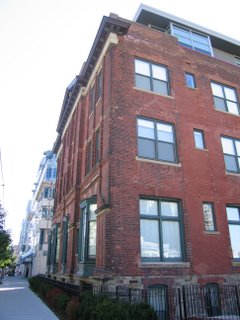
The park has its own website here, which gives a brief history of the Massey-Harris Company which, in its day, was one of the largest manufacturers of farm equipment around.
The Masseys were a tremendously influential family in their day. Vincent Massey was the first Canadian-born Governor General of Canada, and his brother Raymond was a well-known actor. Indeed, the University of Toronto would lack both Hart House and Massey College, the Commons and the Lords of St. George campus, had it not been for the munificence of this family. Or, to be more precise, my family.
In some strange, roundabout way, I am related to them, by blood or by birth I cannot remember. Long ago, I was told stories of moderately distant relatives being invited to the "Massey Family Reunion". In fact, as a small child, I considered myself a Massey, although this form of self-identification has long since expired.
The park itself is a mélange of outdoor styles, with manicured lawns:
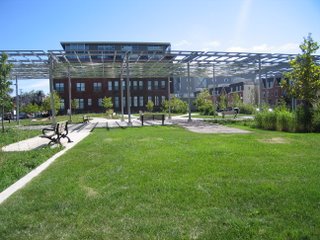 and untamed shrubbery:
and untamed shrubbery: wooden walkways (which constitute the east and west edges of the park):
wooden walkways (which constitute the east and west edges of the park):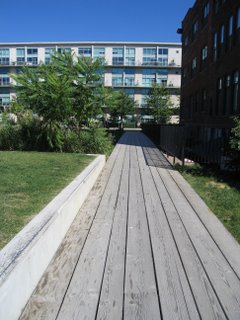
and stairs that lead to nowhere:
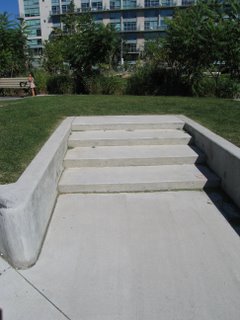 It is a cheeky place, where one is expected to wonder why there are stair that lead to nowhere, or why if you put you hand on a pole with a rounded tip (hmmmm....) water starts shooting out of the ground:
It is a cheeky place, where one is expected to wonder why there are stair that lead to nowhere, or why if you put you hand on a pole with a rounded tip (hmmmm....) water starts shooting out of the ground: It's really quite a show.
It's really quite a show.For those of you who don't live here, Toronto has become quite the dog city. Reflecting that trend, we find a new style of water fountain, with three separate spouts - one for an adult, one for a marginally shorter adult, and, down at the very bottom, one for your poochy buddy:
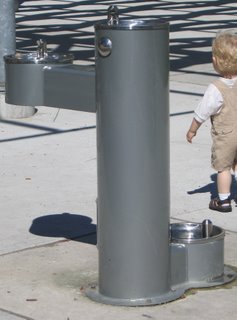 And just when you thought things couldn't be any better, it also happens to be a free Wifi spot thanks to the fine folks at Wireless Toronto.
And just when you thought things couldn't be any better, it also happens to be a free Wifi spot thanks to the fine folks at Wireless Toronto.Picture this. A hot, sunny day, accompanied by your faithful dog and a sleeping infant. You find a spot to sit under the trellis, which both blocks and reflects the sun:
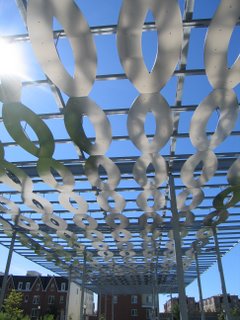 You have water, you have wilderness, you have pelouse, and you have internet access. Dare I mention there's a Starbucks just steps from the park?
You have water, you have wilderness, you have pelouse, and you have internet access. Dare I mention there's a Starbucks just steps from the park?***
As a Calgarian, I was amused by the generous number of "parkettes" that dot Toronto. They were small, and for the longest time, I didn't get them- what's the point of sitting in a park. Aren't parks for walking, listening to Beethoven's sixth symphony and imagining yourself strolling through Heiligenstadt?
How wrong I was. These small green spaces, these points throughout the city where one can catch their breath, have just as much value as a long walk through Edworthy Park would. They show an entirely different approach to bringing the natural back to the city.
We don't have to cordon off the nature already there - we can make it.
In fact, what makes Massey Harris Park work is that it is very much a product of thought. It is not a few trees surrounded by grass, but a deliberate attempt by some very creative people to create an oasis in the desert that makes up much of the modern urban landscape. The attention to detail is appreciated because it's obvious that they cared about what they were building here.
I would argue that it is how we treat the small spaces around us, the ones that don't get much publicity, and not the giant megaprojects Toronto Star columnists demand the city build, that speak to whether or not our urban landscape is improving or deteriorating.
If Massey Harris park, and the transformation at the Princes' Gates are any indication, and I think they are, then the Cassandras in our local media should find another hobby horse to ride because their discourse serves very little. except perhaps to sell papers.
Monday, October 16, 2006
Lister Sinclair
died this morning.
If I had to name a single Canadian who would comfortably bear the title of Renaissance Man, it would be him. Ideas will run a three-part series, starting today, on Sinclair's life, and I would encourage all and sundry to tune in and enjoy a tribute to a man who seems to have been the embodiment of curiosity.
If I had to name a single Canadian who would comfortably bear the title of Renaissance Man, it would be him. Ideas will run a three-part series, starting today, on Sinclair's life, and I would encourage all and sundry to tune in and enjoy a tribute to a man who seems to have been the embodiment of curiosity.
Subscribe to:
Posts (Atom)
